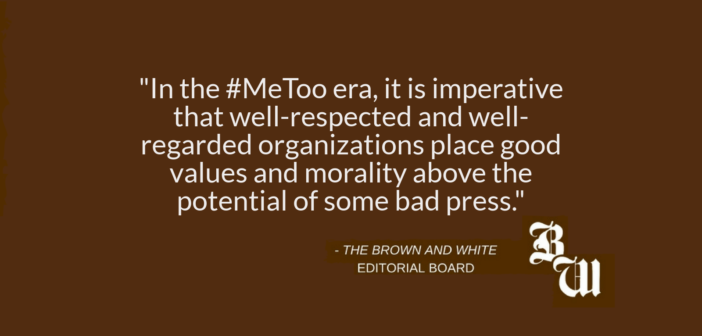Nobody benefits when you try to sweep a wrongdoing under the rug.
Issues are not properly addressed, wounds are not fully healed and it’s morally questionable.
Remember those points when you consider the story of Les Moonves, former CBS chief executive, who exited the company last weekend after facing a swarm of sexual misconduct allegations.
Though most of these allegations became public in July, it has taken until now for the executive to leave the company. An article from The New Yorker highlights six women explaining new allegations because they felt as though CBS was not taking proper action against Moonves.
Similarly, when Lehigh professor James Peterson resigned after allegations of sexual misconduct in January, it made some question the way the school handled the situation.
The first contact made from the administration on the matter was in November 2017 when it sent out an email to the entire Lehigh community stating an unnamed faculty member was accused of sexual and inappropriate conduct and was being placed on leave.
No additional information was provided to students from that point forward.
In January, however, an email was sent to faculty and staff, confirming Peterson as that Lehigh faculty member from the previous message. The school failed to directly inform the student body to confirm anything or inform them of his resignation.
Institutions like CBS and Lehigh have an obligation to truthfully serve their “audience”, so to speak. For CBS, it’s their viewers, and for Lehigh, it’s the student body that pays to attend.
Both CBS and Lehigh should have enough confidence in themselves as respectable institutions to believe that addressing issues forthright will be more beneficial than trying to keep them quiet. They should not be guided by a fear of creating a public relations nightmare.
We know both of these organizations are capable of addressing inappropriate and criminal activity correctly and immediately, so it’s clear that choice and convenience are the main factors influencing when they properly address issues.
After racist vandalism incidents, both last April and in November 2013, Lehigh presidents sent emails to the student body. More action was taken to make students aware of these two crimes, both of which were done by students.
When the perpetrator happened to be a professor, however, Lehigh’s approach was more muted and less involved.
One perception could be that faculty represents the image of the school more than the students do. They go to conferences, partake in research and are more connected with other universities than the student body.
Despite their elevated status, however, the university is legally responsible to treat the actions of faculty with the same level of scrutiny as the actions of students.
Situations like these warrant conversations about enacting a protocol on how to deal with criminal acts on campus. Obviously, crimes vary in their nature and some are more serious than others. But there should be no difference in the way crimes are addressed, whether the defendant is a student or faculty member.
In the #MeToo era, it is imperative that well-respected and well-regarded organizations place good values and morality above the potential of some bad press.
When they don’t, it often comes back to haunt them.






Comment policy
Comments posted to The Brown and White website are reviewed by a moderator before being approved. Incendiary speech or harassing language, including comments targeted at individuals, may be deemed unacceptable and not published. Spam and other soliciting will also be declined.
The Brown and White also reserves the right to not publish entirely anonymous comments.